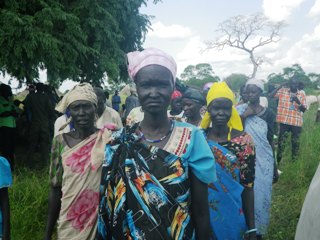Calls for urgent support to returnees in Twic East county intensify
February 9, 2016 (BOR) – At least 3,500 households who had returned to their homes in Lith payam of Twic East county in Jonglei state urgently need of food and none food items, the commissioner told Sudan Tribune Tuesday.

“Currently there are about 3,500 households in the payam who returned from different places, including Uganda, Kenya refugee camps, and IDP camps inside South Sudan. These people have no food, water, and even none food items. So we need humanitarians actors to support urgently”, he said.
On Monday, the humanitarian cluster, comprising of UNICEF, OXFAM, WHO, LWF, WFP, CRS, NRC and HDC, came from Bor, and passed by Lith to assess the humanitarian needs in the area, later proceeding to Duk county.
Other agencies in the area were tasked to conduct join assessment, to identify the needs of the returnees so that possible actions are planned for.
FOOD AND SHELTER NEEDED
According to the Lith payam administrator, Ahou Dual, the pressing needs for those who returned were food, shelter, water as well aasa medications.
But to the head chief of the payam, Awai Ajang Awai, food and shelter still remain top priorities for people who returned to the area after the conflict.
“Our houses got burn. People have nowhere to shelter, no food to eat. So the first priorities would be food and shelter, but medication and water should not be missed out as well”, said Awai.
In Lith payam center alone, about 2,500 houses were reportedly burnt, forcing homeless families to turn schools and churches into their residences.
Majority of the families reportedly rely on bush meat for their survival.
Apajok Deng Riak, who returned from Kenya’s Kakuma refugee camp, said she escaped from the camp without informing the UN Refugee Agency (UNHCR), leaving behind household items due to lack of transport money.
“I decided to leave the camp on my own. I had little money sent to me by relatives, so I and the children left. We left everything behind. I will not go back again”, said Apajok, who came along with about six family members.
(ST)
